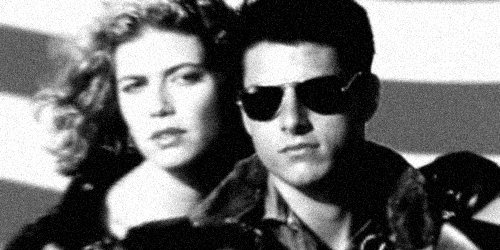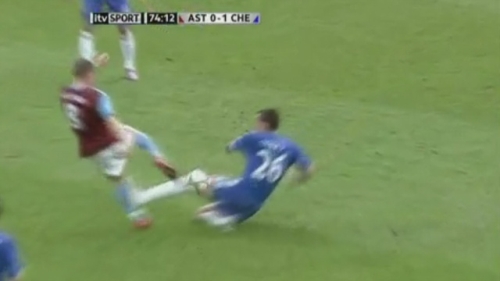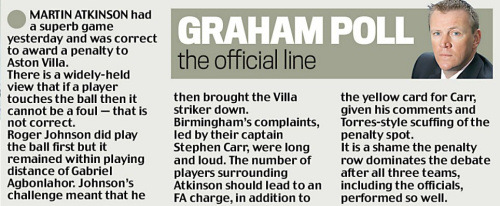The “Erroneous” Penalty And Parroting The Pundits
Written by Dan on April 26, 2010
It happens in almost every televised game. A tasty tackle is made, bodies go flying and the commentators confidently call the incident a foul. Then we see a replay, in slow motion, possibly from a different angle and we hear “oh, he got a touch on the ball first”. It’s repeated to the point that the average football fan, and presumably those repeating this meme, actually believe that a glancing blow between the leather of boot and ball are enough to negate what happens immediately afterward. Not so.
Stuart James of the Guardian believes that the penalty was “erroneously awarded“. I stumbled on a Blues blog which also feels that “the referee erroneously awarded the home side a late penalty“. I’ve searched Joys & Sorrows and do you know how many times the various authors have used the words “erroneous” or “erroneously” to date? You do, don’t you? Yes, just the once! It could be a coincidence, but I’m going to go ahead and assume that the author has read James’ piece in the Guardian and is now simply parroting it on the blog.
Ever one to think outside the box, I’m going to do something different. Crazy even. I’m going to look at what the rules say. I know, hand me my Aviators and call me Maverick.

It’s The Law
The FIFA Laws of the Game state that there are 10 infringements that the referee must award a direct free kick for and if that infringement takes place in the penalty box, then a penalty must be award. I used Webb’s failure to award us a penalty at Wembley as an example of referees being more willing to view an incident as an infringement outside of the box, but are reluctant to see the same type of incident as a foul when it takes place in the box. Presumably because of the consequences.
Here’s what FIFA have to say:-
FIFA
A direct free kick is awarded to the opposing team if a player commits any of the following six offences in a manner considered by the referee to be careless, reckless or using excessive force:
- kicks or attempts to kick an opponent
- trips or attempts to trip an opponent
- jumps at an opponent
- charges an opponent
- strikes or attempts to strike an opponent
- pushes an opponent
A direct free kick is also awarded to the opposing team if a player commits any of the following four offences:
- tackles an opponent to gain possession of the ball, making contact with the opponent before touching the ball
- holds an opponent
- spits at an opponent
- handles the ball deliberately (except for the goalkeeper within his own penalty area)
FIFA refer to these rules as “the six” and “the four”. For the first six rules, the referee is required to assess how the incident took place, but for the second set; “the four”, the referee is only required to decided whether it took place or not, the how is irrelevant.
I’ve added emphasis to the rule I believe that frequently sends so many the wrong direction. It says quite clearly “contact with the opponent before touching the ball“, so if the opposite is true, the ball was touched before the opponent, the other nine infringements can’t possibly relevant and it’s not a foul, right?
To answer that, we might ask James Milner what he thinks. After John Terry made the tackle below, he protested his innocence. On what basis? I can only assume that he thought he touched the ball first. He may well have done, but it doesn’t change the fact that Milner was lucky not to have his leg broken a fraction of a second later.

Sorry James, he got a nick on the ball before he slammed his studs into your shin. Play on!
Interpreting The Rules
You might think I’m being a little facetious with this example; clearly Terry has gone in recklessly, studs up and over the top of the ball, but actually I’m not. Phrases such as “studs up” and “over the top of the ball” are common vernacular and we all understand their meaning, but they don’t appear anywhere in the rules. Neither does “last man” if you’re interested.
The beauty of this game that we love is its simplicity; anyone can play it anywhere there is a little space and ball. That simplicity is reflected in a rule book that runs to only 43 pages, but such simplicity is open to interpretation and that’s where referees come in. They don’t do so without guidance though. The quotes in this post from the FIFA Laws of the Game take up a single page, there is one more that deals with indirect free kicks in the same fashion. The material used to educate referees on the rules contained within those two pages stretches to 81 pages.
Referees view the game through their own framework and translate that back to the actual rules, simple as they may be.
Hypothetically Speaking
Let’s take a recent high profile incident that everyone has an opinion on; the Ryan Shawcross / Aaron Ramsey incident. Regardless of the view on how that incident took place, the overwhelming majority of observers believe it was a foul. Some kind of 50/50 perhaps, but a foul nonetheless.
Imagine that Ramsey arrived a fraction of a second later and didn’t poke the ball away before Shawcross’ boot came swinging through to connect with his shin. Imagine if Shawcross had got a touch on the ball first, but still followed through and broke Ramsey’s leg all the same. Then what? Is it no longer a foul because he touched the ball first?
‘Ah’, you say, ‘that’s why we have terms such as “careless”, “reckless” and “excessive” at the referee’s disposal.’
‘Exactly’, I say.
After The Touch
In this situation, what happened after Roger Johnson got his touch on the ball is extremely relevant. So slight was Johnson’s touch that it takes a view or two of the replay to see it. So slight, in fact, that he didn’t really dispossess Gabby of the ball, it was still right there to be played. As a professional footballer, a striker to be specific, I’m quite certain that Gabby had every intention of playing the ball so tantalizingly close to him in front of goal, but he had his legs unceremoniously taken from underneath him.
Maybe Graham Poll explains it better (thanks to regular reader anotherjames for the tip):-

And I agree, the protests were over the top. The same goes for the players and manager taking turns to berate him after the final whistle. Nothing to do with the opponent here, I really do hope that action is taken.
Even if you were able to construct an argument that Johnson’s touch, as fine and imperceptible as it was, actually did dispossess Gabby of the ball, is it not possible that the referee felt that Johnson had tripped an opponent in a manner he determined to be careless or reckless?
I think that’s possible and the rules do not say anything about that no longer being an infringement if the ball has been nicked away first. In fact, what they do say, specifically in relation to awarding a penalty, is this:-
A penalty kick is awarded if any of the above ten offences is committed by a player inside his own penalty area, irrespective of the position of the ball, provided it is in play.
Sorry Blues fans and pundits who feel this was “erroneous”. It wasn’t, it was a penalty.
Just like it should have been a penalty at Wembley against Chelsea.
